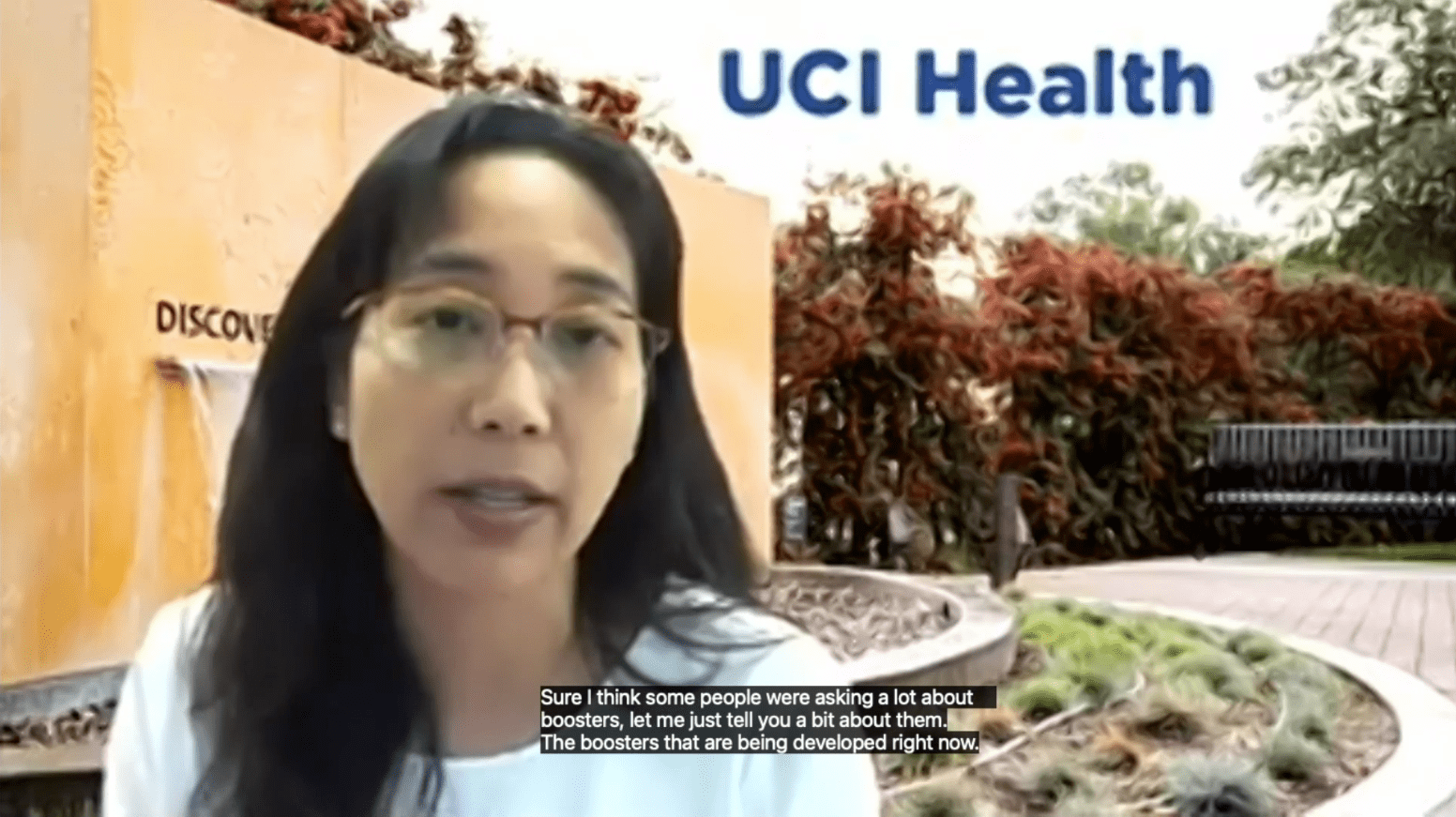UCI Health Affairs town hall provides COVID-19 updates
Campus leaders host virtual event to share latest on pandemic trends and how university is preparing for fall quarter

In UCI’s third town hall of 2021, Health Affairs took the spotlight Friday to share the latest on COVID-19, the delta variant and the University of California vaccination policy. Moderated by Dr. Michael Stamos, dean of the UCI School of Medicine, the Zoom event featured Dr. Susan Huang, director of epidemiology and infection prevention at UCI Health; David Souleles, director of UCI’s COVID-19 response team; and Ramona Agrela, UCI vice chancellor and chief human resources executive. About 1,300 registrants watched as the panelists addressed 90 presubmitted questions.
The topics fell into these main categories: COVID-19 cases; variants; vaccine updates, including boosters and child eligibility; and protection for in-person instruction and working on campus. There was also an overview of the UC vaccination policy that covered compliance and enforcement.
Huang opened the town hall with updates on COVID-19 nationally and locally, sharing that case counts are increasing, largely due to the highly transmissible delta variant combined with a reduction in people wearing face coverings in social settings.
“We have variants because viruses replicate in human bodies,” she said. “When you have a lot of humans propagating the virus, it can mutate – sometimes weaker and sometimes stronger, as is the case with the delta variant, which we have seen is at least 50 percent faster in transmission. We can stop variants by stopping the spread and getting vaccinated so the virus cannot replicate in a host. If one is vaccinated, there is an army of immune cells ready to attack that viral load.”
Both the Pfizer and Moderna vaccines are expected to receive full approval from the Food and Drug Administration at the end of this month or early September, Huang noted.
Children
Many attendees wanted to know about COVID-19 and children. The good news, they were told, is that vaccines for children under 12 are on the horizon. The FDA is expected to authorize emergency use of the Pfizer vaccine for those between the ages of 5 and 11 this winter, for 2- to 5-year-olds a few months later, and for children between 6 months and 2 years old in early 2022.
However, with school starting, another surge is expected, said Huang, who emphasized the importance of children wearing masks at school to help minimize this.
“The best way to protect children is for every adult and teenager around them to get vaccinated,” she said.
Boosters
Vaccine boosters – or third doses – are in the works, Huang noted, but it’s unclear when they’ll be approved. It’s also not clear whether people who’ve already received a particular vaccine will be required to get a booster from the same manufacturer.
“Boosters work to get the antibodies higher,” Huang said. “Antibodies wane, and a third dose will kick them back up.”
Campus safety
Contact tracing, testing and symptom checking are likely to be part of UCI life for the foreseeable future, said Souleles, who’s leading the effort to make the campus as safe as possible for the return to in-person instruction and on-site work this fall. He said that UCI follows guidance from the federal Centers for Disease Control and Prevention, the California Department of Public Health, Cal/OSHA, the Orange County Health Care Agency, and the UC Office of the President.
“Vaccines and masking will greatly help keep communities safe while continuing with activities we all want to engage in,” Souleles said.
He outlined multiple layers of protection for the campus:
- Vaccination is a key strategy – and it’s required by the UC system. Upload your records or apply for an exemption/deferral per the policy.
- Everyone must wear face coverings indoors on UCI property. This applies to all students, staff and faculty, as well as visitors, vendors and contractors.
- Hand hygiene is, as always, essential.
- Daily symptom checking is still required for all students, staff and faculty.
- The asymptomatic testing program will continue for all students and employees who are not vaccinated. In the fall quarter, drop-in testing will be added for anyone in the campus community who is asymptomatic and wants a test.
- If you are symptomatic, consult your healthcare provider. Students can call the Student Health Center.
- UCI’s contact tracing program will continue. Students, staff and faculty are required to participate in contact tracing.
In addition, there will still be designated isolation beds in student housing; Environmental Health & Safety is available to answer questions about cleaning; and all exposure locations will continue to be reported the next day in the UCI Digest campus email.
“There are policies and directives in place,” Souleles said. “COVID changes often, and we make adjustments to our requirements based on the conditions of the pandemic. The UCI Forward webpage has the most current information for the campus and COVID policies.”
Agrela shared with the town hall audience the considerations for returning to on-site work at UCI, which include policy and practice, logistics, policy compliance, safety protocols, and employee support. She reminded employees to take the return-to-campus training via the UC Learning Center, do the daily symptom check and follow mask guidance if they plan to come to campus.
The vaccine mandate
It was explained at the event that the UC vaccination program requires all employees and students who physically access UCI to provide proof of COVID-19 vaccination or apply for an exemption/deferral. There is no exception to this policy.
“Even if you are remote five days a week but you come in to pick up mail once a month, then you must comply with the policy,” Agrela stressed.
Those who are vaccinated must upload their vaccination record into the system by Sept. 6, but employees and students are encouraged to do this as soon as possible. Employees who have been vaccinated against COVID-19 and have not yet submitted verification should do so at the Occupational Health upload portal. Students who have already received the COVID-19 vaccine should upload their vaccination record at the UCI Student Health Center patient portal.
It was clarified that the UC vaccination policy does not apply to visitors.
Students, staff and faculty may apply for a religious exception, a medical exemption, a disability exception or a pregnancy deferral. If the request is approved, the individual will receive confirmation. Human Resources does not see these requests; a third party is acting on the department’s behalf and ensures that everyone’s information is safe and secure.
Noncompliance with the UC vaccination policy includes failure to provide proof of full vaccination; failure to request an exemption/deferral; filing for an exception but being denied; and being approved for a deferral but not following the nonpharmaceutical procedures for safety, such as testing and masking.
Enforcement for employees
Beginning Sept. 7, a notice of noncompliance will be sent to employees who meet the above criteria, and they will be given three days to upload their vaccination record or request an exemption/deferral. These individuals will still be allowed on campus but must comply with the nonpharmaceutical procedures for safety. Failure to do so could result in disciplinary action. After three days, a second notice of noncompliance will be sent, and the recipient will have 14 days to remedy the situation. If a noncompliant employee obtains the first of two COVID-19 vaccinations during this period, he or she will be allotted eight weeks to become compliant. However, if the two-week period passes with no action, the person will be subject to disciplinary measures.
Student enforcement will be communicated through Student Affairs.
Support and resources
“We know this is a stressful time for everyone,” Agrela said. “There are resources on the Future of Work website on resilience, burnout, work-life balance, ergonomic issues and general self-care.”
The website is regularly updated. To help with the transition back to on-site work and in-person instruction, courses will be offered to supervisors and employees.
A video replay of the town hall is available, as is a transcript, and questions will continue to be answered through the “Ask the Expert” feature of the daily UCI Digest campus email.


